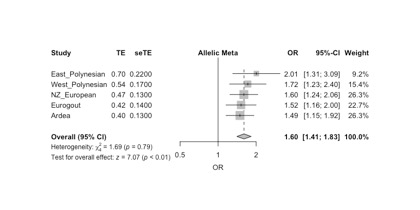Session Information
Date: Tuesday, October 23, 2018
Title: Metabolic and Crystal Arthropathies – Basic and Clinical Science Poster II
Session Type: ACR Poster Session C
Session Time: 9:00AM-11:00AM
Background/Purpose: Although increasing age is an important risk factor for development of gout, disease can develop in younger people. The aim of this study was to determine the genetic features of people with early onset gout.
Methods: Participants (n=1,648) with gout according to the 1977 American Rheumatism Association (ARA) classification criteria were recruited from primary and secondary care into the Genetics of Gout in Aotearoa / New Zealand study. All participants had a detailed clinical assessment which included recording of age of onset of first gout presentation. The 10 single nucleotide polymorphisms (SNPs) most strongly associated with serum urate (Köttgen et al, Nature Genetics 2013) were genotyped by the Illumina CoreExome microarray platform. Early onset gout was defined as first presentation before the age of 40 years, consistent with the EULAR gout management guidelines (Richette et al, Ann Rheum Dis 2017). Genetic associations were also tested in two replication cohorts: Eurogout (n=704) and Ardea clinical trial programme (n=755).
Results: In the Genetics of Gout in Aotearoa study, there were 712 (43.2%) participants with first gout presentation before 40 years of age. Mean (SD) age of onset was 29 (7) years in the early onset group, and 55 (11) years in the late onset group. In the early onset group, there were significantly more men, higher gout flare frequency, and more tophaceous disease compared with the late onset group. Analysis of the serum urate-associated SNPs, stratified by ancestry, demonstrated no significant associations, with the exception of ABCG2 rs2231142; the presence of ABCG2 141K was associated with early onset gout in participants of Eastern Polynesian ancestry (P=0.002), West Polynesian ancestry (P=0.004) and European ancestry (P<0.001). The association with ABCG2 141K persisted after adjustment for sex, highest ever serum urate, tophus, gout flare frequency, serum creatinine and body mass index. Analysis of the replication cohorts confirmed association of early onset gout with ABCG2 rs2231142 (Figure), but not other serum urate-associated SNPs. Compared with no risk alleles, the meta-analysed odds ratio (95% CI) for ABCG2 141K heterozygosity (1 risk allele) was 1.49 (1.27-1.75) and for homozygosity (2 risk alleles) was 2.85 (2.01-4.05).
Conclusion: People with early onset gout have more severe clinical features of disease. In contrast to other serum urate-associated SNPs, ABCG2 141K is strongly associated with early onset of gout.
Figure. Forest plot showing association between early onset gout and ABCG2. Figure shows meta-analysed allelic odds ratio (95% CI).
To cite this abstract in AMA style:
Zaidi F, Phipps-Green A, Tausche AK, So A, Riches P, Andres M, Perez-Ruiz F, Doherty M, Janssen M, Joosten LAB, Jansen T, Kurreeman F, Torres R, McCarthy GM, Miner J, Stamp LK, Merriman TR, Dalbeth N. Systematic Genetic Analysis of Early-Onset Gout: ABCG2 141K Is the Strongest Predictor [abstract]. Arthritis Rheumatol. 2018; 70 (suppl 9). https://acrabstracts.org/abstract/systematic-genetic-analysis-of-early-onset-gout-abcg2-141k-is-the-strongest-predictor/. Accessed .« Back to 2018 ACR/ARHP Annual Meeting
ACR Meeting Abstracts - https://acrabstracts.org/abstract/systematic-genetic-analysis-of-early-onset-gout-abcg2-141k-is-the-strongest-predictor/

